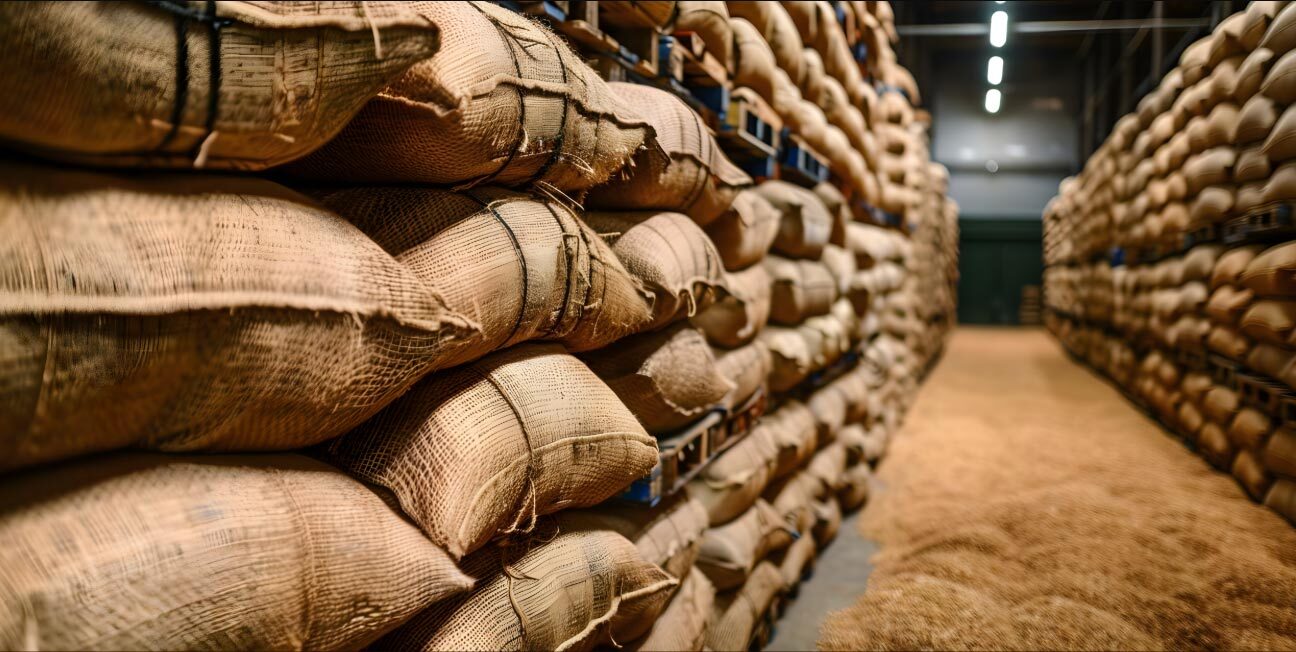
Agriculture in India is not only about crop production; the true pain point arises post-harvest when farmers must store, maintain, conserve, and ultimately sell their product to the right buyer, at the right time, and for the right price. This is where agricultural supply chain logistics comes into play. It is an essential link between production and market that takes the burden off farmers for safe storage, minimizes loss, and ultimately allows for food security. We, as an agri logistics company, at Sohan Lal Commodity Management (SLCM), work every day to ensure the supply chain is more efficient, dependable, and profitable for all stakeholders involved.
Why is Agricultural Supply Chain Logistics Important?
Each year, India produces millions of tonnes of crops. If it weren’t for logistics, a significant amount of supply would be wasted either from poor storage facilities, pests and rodents, thefts, or simply lost days in transit. Agricultural supply chain logistics manages this process, so crops are handled appropriately, stored properly, and delivered promptly.
At SLCM, that is ensuring quality with fumigation and pest management, cocoon fumigation for organic produce, and temperature and humidity control. With the patented solution, Agri Reach, we can manage the life cycle of food grains and perishables at every step. With the right systems, farmers can safeguard the value of their hard work, and consumers can enjoy a quality food experience without interruption. The goal for any agri logistics company will always be to minimize post-harvest losses and build trust across the value chain.What Problems Are Farmers Facing?
Many farmers face challenges like price volatility, post-harvest losses, and storage inefficiencies, often compounded by unpredictable weather patterns. Classic systems aren’t enough to keep out moisture or pest damage. And many farmers have no choice but to sell at harvest for less than they wanted, because they cannot hold onto their crops.
This is where the benefit is felt in collateral management and crop financing. With SLCM integrated post-harvest management solutions, farmers and allied agri stakeholders can use stored crops as collateral to draw loans from banks and financial institutions. This helps to avoid distressed sale situations and allows them to wait for market rates to improve. With a combination of scientific storage capabilities and financial solutions, modern agri logistics puts greater power in farmers’ hands.
How do technology and Phygital solutions help?
At SLCM, logistics is conducted by utilizing Phygital Solutions, a perfect integration of physical structure and digital system. With our widespread warehousing and cold storage facilities, we have advanced monitoring, real-time tracking, AI-powered quality checks, and powerful digital platforms, which ensure efficiency, transparency,and reliability in every process.
Through Phygital warehousing, farmers and traders have instant visibility on stock levels, moisture conditions, and/or temperature, and dispatches. Digital storage receipts and traceability add significant transparency. Technology means that we can provide close visibility on quality and reduce risk. This means that for farmers and traders, they can feel confident that their crops are secure. For an agri logistics company, our Phygital solutions strengthen the overall supply chain and create more efficient systems.
About SLCM
SLCM is the leading agri logistics company providing integrated post-harvest management services around India. SLCM operates over 20,000+ warehouses with 350+ million sq. ft. of storage space as well as 90+ cold storages in the country, assuring scientific, secure, effective storage at a significant scale. In addition to warehousing, the company provides collateral management, procurements, quality testing, and solutions in the digital space, thus increasing transparency and operational efficiencies throughout the value chain. SLCM is rooted in ground realities, and its ecosystem promotes reliability, information for crop financing with institutional partners, and decreased post-harvest loss. SLCM emphasizes innovation and sustainable solutions, while being dedicated to strengthening the agriculture sector, improving productivity in value chains, and enhancing the agri infrastructure in India and around the world, in a resilient manner enabled by technology.
How SLCM Adds Value to Farmers and Traders
Our services are designed with the realities of agriculture in India in mind. With collateral management, farmers can use their stored crops as collateral to access credit. Traders are able to benefit from fast, accurate testing of quality, which allows for the rapid and fair closing of deals. Banks and financial institutions are presented with bankable inventories, supported by the visibility of transparent documents.
Through our Phygital warehousing platform, we give farmers and traders the advantages of physical security and digital visibility. It builds income, reduces waste, and builds trust across the agricultural ecosystem.
The Future of Agricultural Supply Chain Logistics
While the supply of food continues to increase both in India and globally, demand for food is also rising. Meeting that demand will require supply chains to get smarter. In the coming years, agri logistics will need to rely more upon data to inform decision-making based on real-time data, as augmented with blockchain-driven traceability, and increase smart warehousing and management systems.
At SLCM, we believe that combining technology with scale will help agriculture become more sustainable and resilient. The world beyond simply storing crops awaits, as we work toward providing systems that support the efforts of farmers and provide consumers with the best quality produce.
At SLCM, we aspire to improve efficiency, transparency, and profitability within the agriculture sector. If you’re in search of a trusted partner in agri logistics, please connect with us today and see for yourself how we can provide value for your business.


